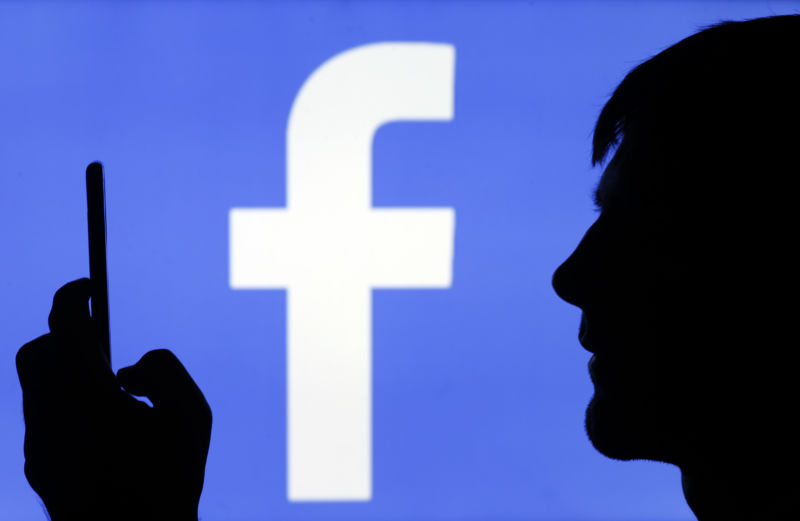“truth” in advertising –
Last month, the company said paid speech was different. This month, not so much.
Kate Cox –

Enlarge/The Facebook logo is displayed on a TV screen on September 9, 2019 in Paris, France.
A few weeks ago, Facebook made it clear that posts shared by politiciansare exemptfrom Facebook’s community standards and also from fact-checking. The company did, however, indicate one area where posts made by politicians’ accounts could be subject to scrutiny: in paid advertising. Faced with a stark real-world test, though, Facebook appears once again to be erring on the side of letting misinformation circulate far and wide if a politician promotes it.
The ad in question involves — you guessed it — President Donald Trump and his campaign for re-election. The Trump campaign in the past week has been airing ads on Facebook making false accusations about former Vice President Joe Biden, a Democratic candidate for the 2020 presidential nomination. The ads’ claims about Biden’s activities in Ukraine and elsewhere have beenrepeatedly debunkedas baseless conspiracy theories, not only bymedia outletsbut also byRepublican politicians.
Cable network CNN deemed the ads in questiontoo misleadingto broadcast and refused to air them. Facebook, however, considers the matter out of its hands.
The Biden campaign explicitly asked Facebook to take down the ad, but the company declined.
“Our approach is grounded in Facebook’s fundamental belief in free expression, respect for the democratic process, and the belief that, in mature democracies with a free press, political speech is already arguably the most scrutinized speech there is, “Facebook wrote in a response to the Biden campaign obtained byCNET. “If the claim is made directly by a politician on their Page, in an ad or on their website, it is considered direct speech and ineligible for our third-party fact checking program,” the company added.
Rules change
Facebook said in September that politicians’ speech was exempt from the company’s content rules, but that exemption had two limitations. Previously debunked information, the company said, would not be allowed in advertisements:
When a politician shares previously debunked content including links, videos and photos, we plan to demote that content, display related information from fact-checkers, and reject its inclusion in advertisements.
Nor did the “newsworthiness” exemption to standards and speech apply without any limits to advertising, the company added:
In keeping with the principle that we apply different standards to content for which we receive payment, this will not apply to ads — if someone chooses to post an ad on Facebook, they must still fall within our Community Standards and our advertising policies.
Those advertising policies used to contain an explicit ban against misleading content. But as newsletter Popular Informationnoted last week, the language in Facebook’s stated Advertising Policy has recently changed. While the guideline used to say that ads “must not contain deceptive, false, or misleading content,” the rule now prohibits ads “that include claims debunked by third-party fact checkers” or, in some circumstances, by third-party organizations ” with particular expertise “in the matter.
Massachusetts Sen. Elizabeth Warren, also a candidate for the 2020 Democratic nomination and outspoken critic of Facebook, slammed the company in aseries of tweets. Facebook is “deliberately allowing a candidate to intentionally lie to the American people,” Warren said, adding, “This is a serious threat to our democracy. We need transparency and accountability from Facebook.”
All downhill from here?
With just over a year to go before the actual 2020 election, the problems are going to get worse before they get better — if they ever get better. Instances of both misleading speech by politicians and deliberate misinformation by malicious actors will almost certainly continue to increase, and social media platforms, especially Facebook, will need to develop more robust strategies to deal with both.
The Senate Intelligence Committee this week issued ascathing report( (PDF) delving into Russian state-sponsored misinformation on social media and how it uses Facebook and other platforms to influence US politics and elections.
““ Russia is waging an information warfare campaign against the US that didn’t start and didn’t end with the 2016 election, “Committee Chairman Richard Burr (RN.C.) said in a statement. “Any solution has to balance America’s national security interests with our constitutionally-protected right to free speech. Social media companies, federal agencies, law enforcement, and Congress must work together to address these challenges.”
Vice Chairman Mark Warner (D-Va.) Echoed the sentiment, warning, “With the 2020 elections on the horizon, there’s no doubt that bad actors will continue to try to weaponize the scale and reach of social media platforms to erode public confidence and foster chaos. adversaries to expand upon – and their techniques will only get more sophisticated. “

(Read More) ******************************************)





GIPHY App Key not set. Please check settings